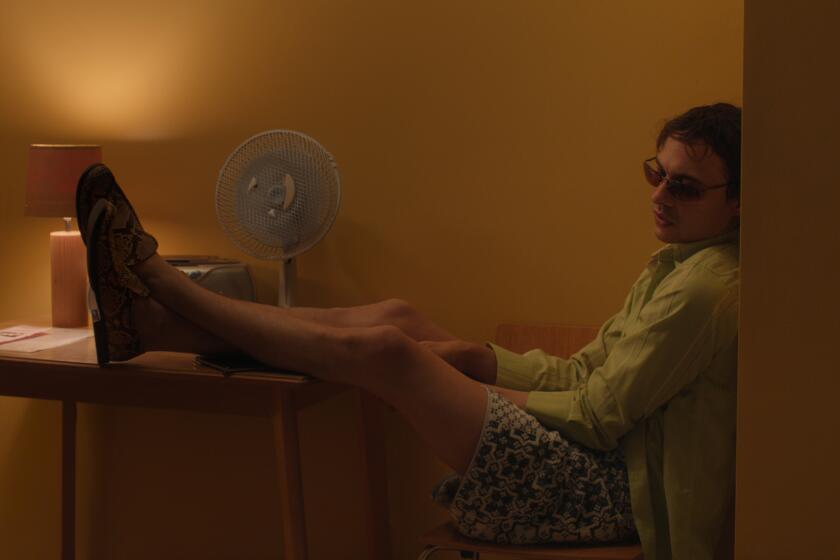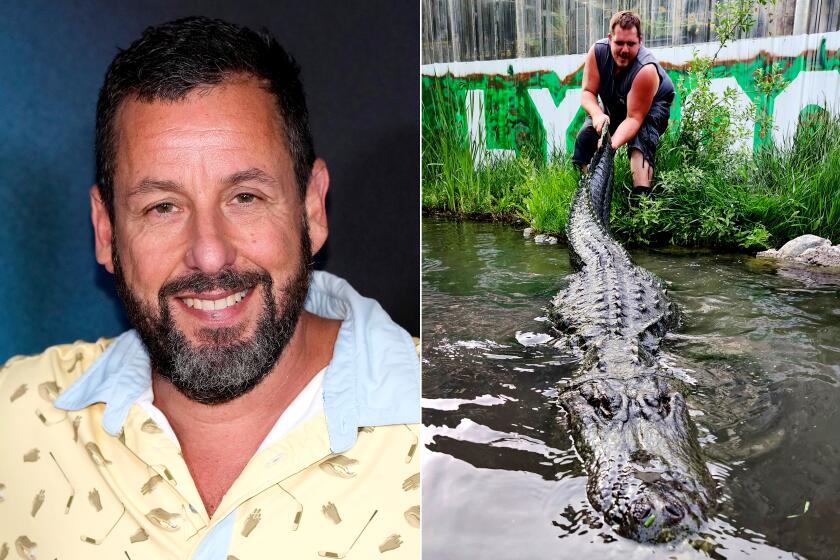‘Epicenter U.’ Captures Earthquake Aftermath : Education: CSUN film students’ work documents frustration, anxiety and hope that followed the devastating temblor.
- Share via
NORTHRIDGE — They knew the genre well--how to light the scene starkly and set the camera low to achieve an ominous, bigger-than-life effect. But the film students figured the only disaster they would ever shoot would begin and end on a Hollywood sound stage.
Then, an earthquake came to town.
Nine months after the Jan. 17 temblor laid their classrooms low, Cal State Northridge film students and their professor are putting the final touches on a bittersweet project: a documentary film on the Northridge quake that left them out of school and out of their homes, shaken and mourning the loss of friends.
Aptly titled “Epicenter U.,” the 16-millimeter film is a quirky mix of disaster and academia, of therapy and movie-making, of rubble and rising from it. “It’s painful to be in an earthquake, but it’s a joy to make a film about it,” said professor and producer Alexis Krasilovsky.
A documentary filmmaker of 20 years, Krasilovsky began “Epicenter U.” before the earth had settled back into itself that Monday morning. When the appliances stopped toppling at her Silver Lake home, she calmed her shaken, but safe, 6-year-old son and allowed herself a moment of contemplation over their close call with a 14-foot bookshelf. Then she ran for her movie camera.
Buildings were coming down, flames were rising up, and the filmmaker’s instinct took over.
“I was like salivating,” she said. “It was a Pavlovian reaction.”
When her class met next, Krasilovsky asked how many of her students’ homes had been damaged. Most students raised their exhausted hands, and shooting began in earnest despite far more pressing concerns.
*
A scene with Salvador Morales is dark and shaky.
He stands against a chain-link fence, a crumbling apartment complex behind him. He speaks in jagged sentences. “This is the building where I live . . . yellow-tagged. I have to stay there.”
The setting changes, more rubble. Morales has moved inside his apartment, pulling at a shard of sheet rock. “They looted my apartment. They stole my piano. I couldn’t believe it, because it’s a heavy piano . . . I don’t care about what I lost, but you kind of lose faith in the human race.”
Working on both sides of the camera, Morales joined the cast and crew of “Epicenter U.” after delaying his own student film.
The most costly natural disaster in U.S. history was a startling and strange event that demanded documentation, he said. For while looters stole his 1910 upright and his art-major wife’s paintings, other people ran into the street to help neighbors they’d never met. The good, the bad and the fantastic was unfolding before his eyes.
Dedicated to the memory of CSUN students Manuel Sandoval and Jaime Reyes, among the 16 killed when the Northridge Meadows Apartments complex collapsed, the film concentrates on the earthquake’s effects on the university and its students. But, as all good filmmakers know, keeping the focus of the story tight helps make the theme universal.
“The film is dealing with emotions that come out of all natural disasters,” said executive producer Deborah Abrams, a former student of Krasilovsky.
And so it’s not just students who have gotten involved. Many in the film industry experienced the quake as well, and have offered invaluable support so the shoestring production will be ready for a premiere on the quake’s first anniversary.
They’ve donated editing equipment, cameras, film, lighting. A man at a production shop wouldn’t accept Krasilovsky’s check for his work on the soundtrack. His Woodland Hills home was demolished, he told her, and he wanted only a copy of the finished film as payment.
*
Editor Amy Tompkins gave up better-paying feature film work for the rest of the year to splice together the footage. Some of it is raw and overexposed, she said, lending a unique feel to the piece, a sense that shaken young filmmakers are simultaneously learning their craft and documenting their scattered lives.
“It’s very endearing,” she said.
Just before the credits roll, the passionate voice of civil rights activist and former U.N. Ambassador Andrew Young sounds. It is his commencement speech given June 6 to those who graduated despite the quake: “You’ve been blessed by having been born in difficult times. Go and . . . contribute these blessings.”
As Young’s voice fades, a grinning graduate runs in slow-motion toward the camera, his mortarboard in place, tassel swinging.
More to Read
Only good movies
Get the Indie Focus newsletter, Mark Olsen's weekly guide to the world of cinema.
You may occasionally receive promotional content from the Los Angeles Times.










